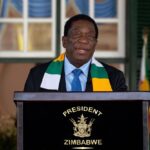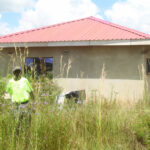In the midst of political tensions following the disputed August 23-24 elections in Zimbabwe, opposition leader Nelson Chamisa of the Citizens Coalition for Change (CCC) has voiced concerns over the safety of his supporters.
Chamisa alleges that suspected members of the ruling Zanu PF party and State security agents are harassing his followers, demanding information about his next steps after rejecting the election results.
While there was anticipation that Chamisa would file a Constitutional Court application challenging the election outcome, he did not proceed with this course of action. Instead, he has opted to dispatch senior party officials on a diplomatic offensive to seek the support of regional leaders for a fresh election.
Speaking to reporters, Chamisa expressed his dismay at the alleged harassment of his supporters and pledged to take the matter to the relevant authorities, both domestically and internationally. He visited two CCC members, Womberaiishe Nhende and Sonele Mukhulani, who were reportedly abducted and subjected to torture by suspected State security agents. The victims are currently receiving medical treatment at a private hospital in the capital.
The situation escalated further when lawyers representing the two CCC members, Douglas Coltart and Tapiwa Muchineripi, were arrested after objecting to their clients’ police interviews. The lawyers, who were granted bail, have been charged with obstructing the course of justice.
Chamisa condemned the reported acts of violence and emphasized that his party advocates for open, peaceful, and constitutional actions. He questioned the motives behind the torture, suggesting that it was a consequence of individuals lacking information about his plans. He also accused Zanu PF of engaging in a campaign of retribution against his supporters throughout the country.
In response to Chamisa’s claims, Zanu PF’s acting information director, Farai Marapira, dismissed them as attention-seeking tactics. Marapira stated that if there was concrete evidence of victimization, the law would take its course, but without such evidence, Zanu PF viewed the allegations as internal power dynamics within the CCC.
The CCC is rallying regional support to challenge the legitimacy of the recent elections. Election observer missions, including the one from the Southern African Development Community (SADC), have issued critical reports suggesting that the polls were not credible.
Meanwhile, President Emmerson Mnangagwa was recently sworn in at a ceremony attended by only 3 regional leaders out of the 67 he had invited. The political landscape in Zimbabwe remains tense as various parties and stakeholders navigate the aftermath of the disputed elections.












